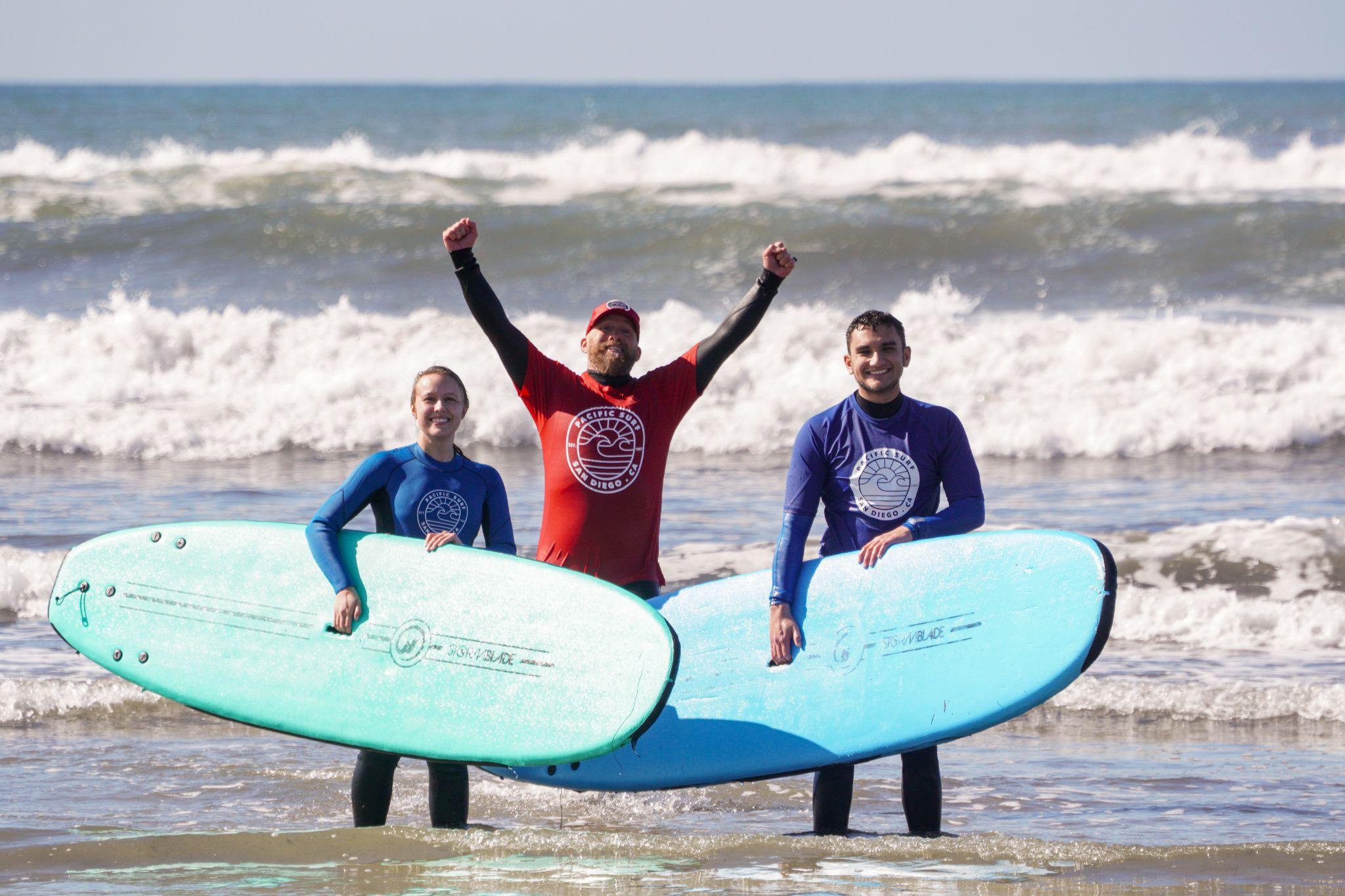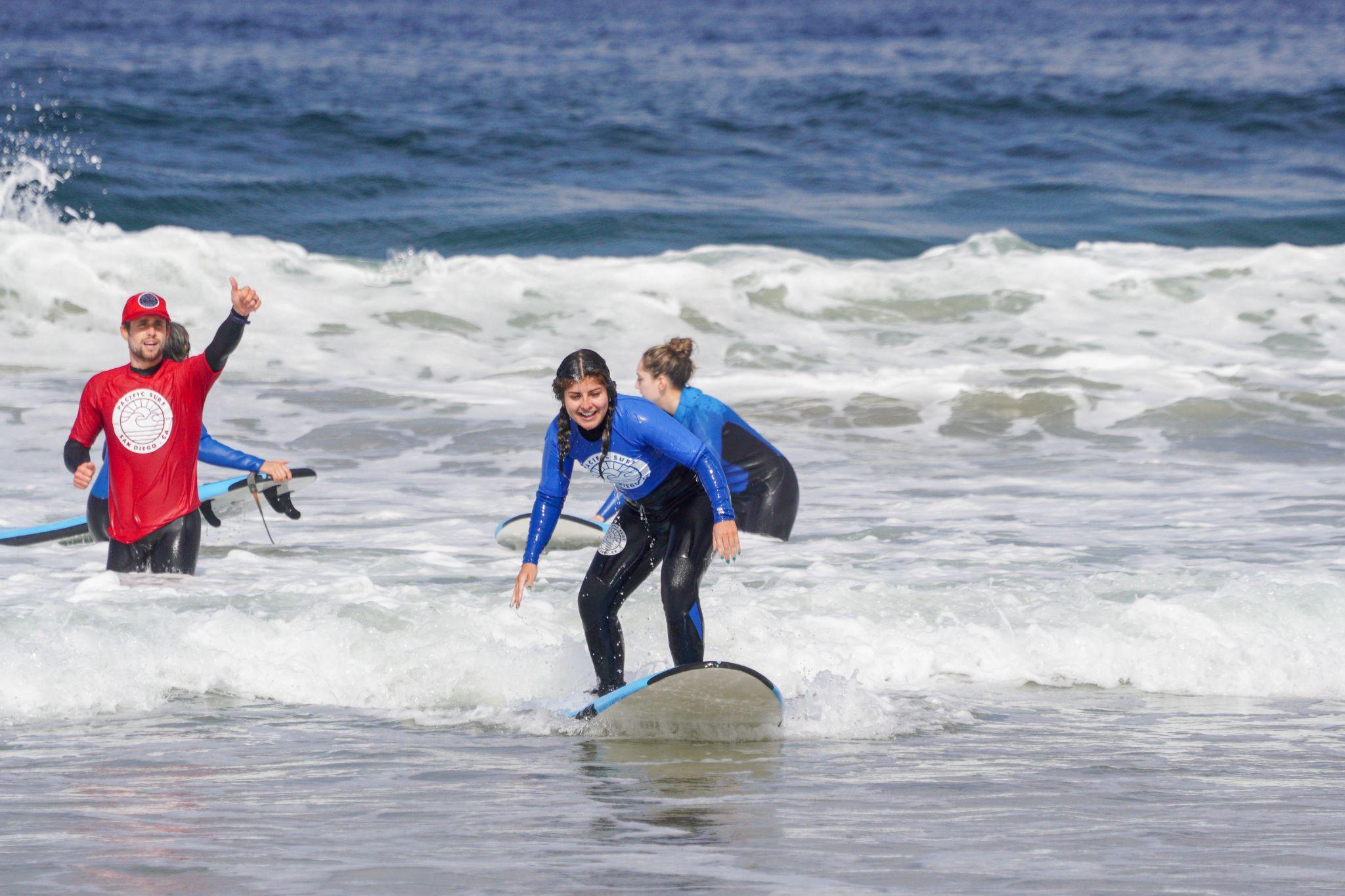At Pacific Surf School, instructors play an extremely important role in both introducing beginners to the ocean and waves and guiding more experienced surfers to enhance their skills.
However, it’s important to note that the role of the instructor goes beyond teaching paddling techniques, as it also requires skills, ethical responsibilities, and human connection to ensure that each student’s learning experience is always the best it can be.
Table of Contents
But, after all, what impact do surf instructors have on students’ learning and development experience?
Surf instructors play a fundamental role in students’ learning and development experience, going beyond simply teaching surf techniques. They are mentors, facilitators, and often catalysts who help students explore their full potential both in and out of the water.
Inspiration and Motivation
Surf instructors often act as role models, inspiring students with their passion for surfing and their commitment to excellence. Their contagious energy and enthusiasm for the sport can motivate students to overcome challenges, persevere in the face of obstacles, and constantly seek improvement.

Human Connection and Trust
In addition to imparting technical knowledge, surf instructors develop a personal connection with their students, building trust and providing a safe environment to explore new skills. This trust relationship is essential for students to feel comfortable facing the challenges of surfing and opening up to new experiences.
Constructive Feedback and Personalized Guidance
Surf instructors provide individualized feedback and personalized guidance, helping students understand their strengths and areas for improvement. By offering subtle corrections and practical tips, instructors empower students to progressively improve their skills, which significantly contributes to their development as surfers.
Fostering a Resilient Mindset
Through their own surfing experiences and the guidance they offer, instructors help students cultivate a resilient mindset. They teach the importance of persistence, adapting to changes in sea conditions, and learning from mistakes, preparing students to face challenges not only in surfing but also in life.
Transmission of Values and Ethics
In addition to teaching technical skills, surf instructors convey fundamental values, such as respect for the ocean, surf ethics, safety, and environmental responsibility. These values are essential for creating a sustainable surfing community and inspiring students to become conscientious and compassionate citizens.
Pacific Surf School Instructors
Before getting on a surfboard and guiding students through the waves, a Pacific Surf School instructor needs to acquire a series of essential skills and understand the ethical responsibilities inherent to their role.
Being a surf instructor at Pacific Surf School goes far beyond simply knowing how to surf; it requires a combination of technical, interpersonal, and safety skills, as well as an ethical commitment to students’ safety and the preservation of the marine environment.

Among the skills required to become a surf instructor at Pacific Surf School:
- Technical Proficiency in Surfing: A Pacific Surf School surf instructor must have a solid mastery of surfing techniques, including paddling, turning, and wave positioning. This not only allows the instructor to demonstrate skills to students but also gives them the ability to analyze and correct their techniques.
- Clear and Effective Communication: The ability to convey instructions clearly and effectively is essential for a Pacific Surf School surf instructor. They must be able to communicate surfing techniques in a way that is accessible and adaptable to each student’s skill level and understanding.
- Empathy and Patience: Being able to put themselves in the students’ shoes and understand their frustrations and challenges is essential for a surf instructor, whether at Pacific or any other school. Patience is a virtue, especially when dealing with beginner students who may face difficulties adapting to surfing.
- Teaching Skill and Constructive Feedback: A good surf instructor knows how to motivate, encourage, and correct students constructively. They must be able to identify each student’s areas for improvement and provide personalized feedback to help them progress.
- Safety and First Aid Knowledge: The safety of students must be the top priority for a Pacific Surf School surf instructor. They must be well-versed in water rescue techniques, able to assess sea conditions, and prepared to deal with emergencies. Additionally, having basic first aid knowledge is essential.
- Promoting Respect for the Marine Environment: As ocean advocates, Pacific Surf School surf instructors promote respect for and preservation of the marine environment. This means encouraging sustainable practices, such as reducing litter and protecting coastal ecosystems.
Being a surf instructor at Pacific Surf School is more than just teaching surfing—it’s a commitment to excellence, safety, and the preservation of the marine environment. With technical, interpersonal, and safety skills, instructors empower students not only to surf but also to respect and protect the oceans.


















